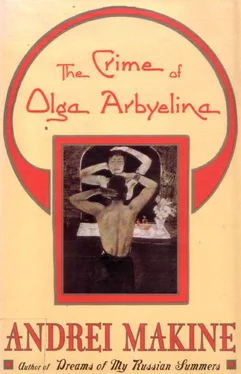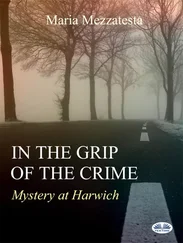Once male pride had been appeased, however, the key question returned: "But at the end of the day, what weird twist of fate brought them together?"
Be that as it may, by dint of tireless preliminaries, the whole scenario of the tragedy ended up being pinpointed with the conciseness of an epigram. And this was notably done in the observation attributed by rumor to the investigating magistrate: "This is the first time in my life I have had to convince a person that they are not guilty of murder." Another fragment, with the same aphoristic brevity, reported the riposte made by the magistrate to the interpreter. The latter had remarked in surprise: "But don't you think that, in accusing herself of one crime, she's trying to cover up another?"
The reply was trenchant.
"A killer breaks a shop window, admits it, goes to prison, and gets away with a murder. But you don't accuse yourself of murder in order to cover up a broken window."
That is how the affair was pictured during those summer months in Villiers-la-Forêt. The few who went away on vacation discovered new details on their return, strange revelations that their neighbors were eager to impart to them. Their game of a thousand voices resumed more merrily than ever…
And it was after a great delay, early in the fall, that they learned this mind-boggling news: some time previously the case of the Russian lovers had been formally closed for want of evidence. It was only then that they realized Princess Arbyelina's house was empty and she and her son were no longer to be seen.
Yes, the curtain had been rung down just when their scenarios were taking on more and more substance, when they were so close to knowing the truth!
The people of Villiers found it hard to conceal their disappointment. They had grown so accustomed to the pleasantly fevered climate that the love and death of the horse butcher had caused to reign in their town. What they felt especially nostalgic for, though often without realizing it, was the secret life that the unfortunate passengers on that old boat had revealed to them. It had appeared that in their dull little town quite another life could be simmering away-devastating in its passions, criminal, multifarious. Unexpected. A life in which an obscure retired man was capable, heedless of the cost, of embracing a redoubtable beauty who, for obscure reasons, allowed herself to be seduced. A subterranean life, free, filled with promises and temptations. At least that was how most of the townspeople had perceived the blazing affair between the princess and the horse butcher.
• • •
But the most surprising event occurred a little later, when the first mists were beginning to filter through into the lower town in the mornings. One day, as if by magic, everybody forgot the boating tragedy, the woman sitting on the bank, the drowned man stretched out on the grass. As if they had never existed!
The people of Villiers talked about power cuts, the schedules for which were printed in the newspapers; about the meat shortages just starting, about Princess Elizabeth's wedding: about the stars in The Best Years of Our Lives… And if anyone had taken it into his head to refer to the previous summer's inquiry, he would have committed an unpardonable gaffe, like telling an old joke that people no longer find funny.
Besides, soon the autumn floods covered the site of the ill-fated rendezvous and the bank where the man and woman had frozen in their involuntarily theatrical poses under the eyes of the spectators. The boat, whose side the people of Villiers had liked to poke their fingers into at the spot deeply torn by the collision, ended up among other wrecked vessels, its terrible singularity effaced among the peeling hulls, half hidden in the mist.
The expanse of meadowland covered in water was so bleak, the branches of the alders so trembling and tortured that it no longer occurred to anyone in Villiers-la-Forêt to ponder what kind of love or hate had brought two strange Russian summer folk together on this riverbank.
Night has fallen. A moment ago the old keeper stopped talk-
ing. His hand resting on the lock of the gate, he is waiting for the man dressed in a student's jacket to go. But the latter seems not to notice this gesture. His eyes, unmoving, are filled with a torrent of shapes, places, grimacing faces; of cries; of days.
The tale has been told with the simplicity of the previous anecdotes: a man, a woman, an inexplicable pairing, a death or a murder. And oblivion. Nevertheless, this last visitor has managed to glimpse the fine strand of weed clinging to the drowned man's brow. He has sensed the disturbing intensity that the presence of the lifeless body bestowed on the scents of summer, the murmur of insects among the plants on the riverbank. He has heard the remarks whispered by the curious. He has experienced that delicious apprehension with which, later, they would come and thrust their fingers into the breach in the side of the boat.
His eyes dazzled by this imagined world, he stands transfixed, straining to hear the words that he still seems to make out down there: the strangely cadenced voice of the woman, replying to the magistrate. Now he thinks he can even understand the shackled sentences of the stammerer.
The old man takes out a heavy bunch of keys, shakes it. But the other does not hear. His vision isolates him in the night: "To be able to see what others do not see, do not wish to see, do not know how to see, are afraid to see-like all those visitors to the cemetery, who have been filing past this old man from time immemorial. Yes, to guess that the dress of the woman seated on the riverbank, the dress torn during a brief and appalling struggle, was gradually losing its transparency as it dried and beginning to conceal her body more fully To see the increasing opacity of this fabric is already to enter into this woman's life…"
The old man slowly draws the gate to and turns the key in the lock. The two of them remain inside the cemetery.
– ?
The invitation to drink tea seems to awaken the man in the corduroy jacket from his reverie. He accepts and, as he walks along beside the old man, notices that on the crosses several night-lights in their tiny glass cages are still shining, scattered through the darkness. In the distance the glowing window of the keeper's house also resembles a night-light, gradually growing broader as they approach, and admitting them, as a candle flame does if you stare at it for long enough, thereby entering its flickering, violent life.
She knew that the pain we feel, physical as well as mental, is partly due to our indignation at pain, our astonishment at it, our refusal to accept it. To avoid suffering, she always employed the same trick: making a mental list. What you have to do is take note, as dispassionately as possible, of the presence of things and people brought together by the painful situation. Name them very simply, one after the other, until their total improbability hits you in the eye. And so she was listing them now, first of all noticing the drawn curtains, the edges of which were fastened together by half a dozen clothespins. The dark curtains, the ceiling lit from the side by a lamp placed on a chair. And on the ceiling, as well as on the wall, those two angular shadows, dark and clear cut: the outline, like a capital M, of the legs of a woman lying on her back with her knees up. And another shape, this one moving; a gigantic head with two horns, appearing at intervals between the triangles of the bent legs. Yes, these two women linked by the silent work one of them was carrying out on the other one's body, in a stifling room, late one afternoon in August.
A precise pain, sharp as an injection, made her interrupt her list-making and close her eyes tightly. But she must start again quickly, so as to leave herself no time for indignation. So; the August sun, whose dusty indolence could be sensed, despite the drawn curtains and the closed shutters. Beyond the shutters, on the sidewalk, a few inches away from the insulated interior of the room, an encounter between two passersby, their conversation ("Mark my words, we won't be seeing a lot of meat next year"); then the clatter of a streetcar and the faint answering tinkle of the glasses in the cupboard. Then, like an amplification of that tenuous sound-the rattling of a metallic instrument on a tray.
Читать дальше












